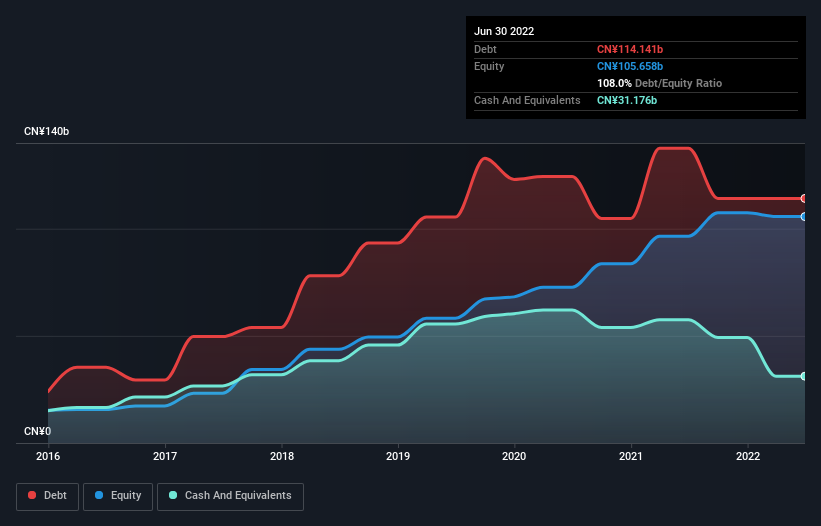Warren Buffett famously said, 'Volatility is far from synonymous with risk.' It's only natural to consider a company's balance sheet when you examine how risky it is, since debt is often involved when a business collapses. Importantly, CIFI Holdings (Group) Co. Ltd. (HKG:884) does carry debt. But should shareholders be worried about its use of debt?
When Is Debt Dangerous?
Debt is a tool to help businesses grow, but if a business is incapable of paying off its lenders, then it exists at their mercy. In the worst case scenario, a company can go bankrupt if it cannot pay its creditors. While that is not too common, we often do see indebted companies permanently diluting shareholders because lenders force them to raise capital at a distressed price. Of course, plenty of companies use debt to fund growth, without any negative consequences. When we think about a company's use of debt, we first look at cash and debt together.
Our analysis indicates that 884 is potentially undervalued!
What Is CIFI Holdings (Group)'s Debt?
As you can see below, CIFI Holdings (Group) had CN¥114.1b of debt at June 2022, down from CN¥137.6b a year prior. However, it also had CN¥31.2b in cash, and so its net debt is CN¥83.0b.

How Healthy Is CIFI Holdings (Group)'s Balance Sheet?
The latest balance sheet data shows that CIFI Holdings (Group) had liabilities of CN¥203.7b due within a year, and liabilities of CN¥100.7b falling due after that. Offsetting this, it had CN¥31.2b in cash and CN¥94.9b in receivables that were due within 12 months. So its liabilities outweigh the sum of its cash and (near-term) receivables by CN¥178.3b.
The deficiency here weighs heavily on the CN¥4.49b company itself, as if a child were struggling under the weight of an enormous back-pack full of books, his sports gear, and a trumpet. So we'd watch its balance sheet closely, without a doubt. After all, CIFI Holdings (Group) would likely require a major re-capitalisation if it had to pay its creditors today.
In order to size up a company's debt relative to its earnings, we calculate its net debt divided by its earnings before interest, tax, depreciation, and amortization (EBITDA) and its earnings before interest and tax (EBIT) divided by its interest expense (its interest cover). The advantage of this approach is that we take into account both the absolute quantum of debt (with net debt to EBITDA) and the actual interest expenses associated with that debt (with its interest cover ratio).
Strangely CIFI Holdings (Group) has a sky high EBITDA ratio of 6.0, implying high debt, but a strong interest coverage of 183. So either it has access to very cheap long term debt or that interest expense is going to grow! We note that CIFI Holdings (Group) grew its EBIT by 22% in the last year, and that should make it easier to pay down debt, going forward. There's no doubt that we learn most about debt from the balance sheet. But ultimately the future profitability of the business will decide if CIFI Holdings (Group) can strengthen its balance sheet over time. So if you're focused on the future you can check out this free report showing analyst profit forecasts.
Finally, while the tax-man may adore accounting profits, lenders only accept cold hard cash. So it's worth checking how much of that EBIT is backed by free cash flow. During the last three years, CIFI Holdings (Group) produced sturdy free cash flow equating to 74% of its EBIT, about what we'd expect. This cold hard cash means it can reduce its debt when it wants to.
Our View
While CIFI Holdings (Group)'s level of total liabilities has us nervous. For example, its interest cover and conversion of EBIT to free cash flow give us some confidence in its ability to manage its debt. We think that CIFI Holdings (Group)'s debt does make it a bit risky, after considering the aforementioned data points together. That's not necessarily a bad thing, since leverage can boost returns on equity, but it is something to be aware of. The balance sheet is clearly the area to focus on when you are analysing debt. However, not all investment risk resides within the balance sheet - far from it. For example, we've discovered 5 warning signs for CIFI Holdings (Group) (2 can't be ignored!) that you should be aware of before investing here.
When all is said and done, sometimes its easier to focus on companies that don't even need debt. Readers can access a list of growth stocks with zero net debt 100% free, right now.
New: AI Stock Screener & Alerts
Our new AI Stock Screener scans the market every day to uncover opportunities.
• Dividend Powerhouses (3%+ Yield)
• Undervalued Small Caps with Insider Buying
• High growth Tech and AI Companies
Or build your own from over 50 metrics.
Have feedback on this article? Concerned about the content? Get in touch with us directly. Alternatively, email editorial-team (at) simplywallst.com.
This article by Simply Wall St is general in nature. We provide commentary based on historical data and analyst forecasts only using an unbiased methodology and our articles are not intended to be financial advice. It does not constitute a recommendation to buy or sell any stock, and does not take account of your objectives, or your financial situation. We aim to bring you long-term focused analysis driven by fundamental data. Note that our analysis may not factor in the latest price-sensitive company announcements or qualitative material. Simply Wall St has no position in any stocks mentioned.
About SEHK:884
CIFI Holdings (Group)
Engages in the property development and investment business in the People’s Republic of China.
Undervalued with moderate growth potential.
Similar Companies
Market Insights
Community Narratives



